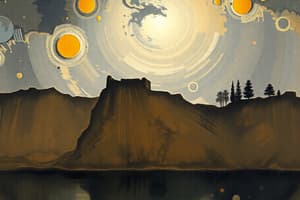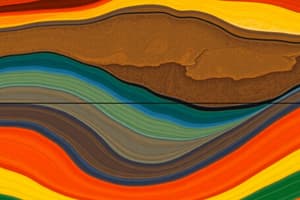Podcast
Questions and Answers
How long ago did oceans begin to form?
How long ago did oceans begin to form?
3800 MYA
What does the geologic time scale confirm about the Cretaceous period?
What does the geologic time scale confirm about the Cretaceous period?
It ended during the Mesozoic era.
What do scientists need to do to determine what time period Eocene belongs to on the geologic time scale?
What do scientists need to do to determine what time period Eocene belongs to on the geologic time scale?
Study information related to the Cenozoic era.
Why is radioactive dating important when approximating the age of Earth?
Why is radioactive dating important when approximating the age of Earth?
What was the significance of collisions of dust, rock, and ice during Earth's formation?
What was the significance of collisions of dust, rock, and ice during Earth's formation?
Which describes oxygen content as Earth evolved over time?
Which describes oxygen content as Earth evolved over time?
Which describes the geological time of the first land plants?
Which describes the geological time of the first land plants?
Which unit of geologic time is the oldest?
Which unit of geologic time is the oldest?
Which evidence is most likely used to indicate the beginning of solar system formation?
Which evidence is most likely used to indicate the beginning of solar system formation?
How long ago did invertebrates become common on Earth?
How long ago did invertebrates become common on Earth?
Flashcards are hidden until you start studying
Study Notes
Formation of Oceans
- Oceans began to form approximately 3800 million years ago (MYA).
Cretaceous Period
- The Cretaceous period ended during the Mesozoic era, confirming its chronological placement on the geologic time scale.
Eocene Time Period
- The Eocene existed around 34 million years ago and must be studied within the context of the Cenozoic era to determine its precise temporal placement on the geologic time scale.
Importance of Radioactive Dating
- Radioactive dating enables scientists to establish the sequence of rock formation events, aiding in approximating Earth's age.
Earth's Formation
- Collisions of dust, rock, and ice during Earth's formation were significant for altering the density of materials present on the planet.
Oxygen Content Evolution
- Oxygen levels in Earth's atmosphere have remained above 15 percent since approximately 200 million years ago.
Introduction of Land Plants
- The first flowering plants appeared toward the end of the Mesozoic era, marking a significant development in terrestrial flora.
Oldest Geologic Time Unit
- The oldest unit of geologic time is known as the Precambrian, encompassing the earliest periods of Earth's history.
Solar System Formation Evidence
- The initial formation of the solar system was indicated by materials being drawn together through gravitational forces.
Rise of Invertebrates
- Invertebrates became common on Earth around 520 million years ago, marking an important evolutionary milestone.
Studying That Suits You
Use AI to generate personalized quizzes and flashcards to suit your learning preferences.




